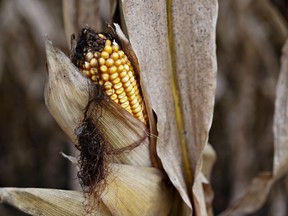Canada Joins U.S. Trade Complaint Against Mexico’s GMO Corn Ban
In a significant development, Canada has announced that it will participate in the trade dispute initiated by the United States against Mexico over its restrictions on genetically modified corn imports.
Background: The Dispute Settlement Consultations
The dispute between the United States and Mexico began when the U.S. Trade Representative, Katherine Tai, requested dispute settlement consultations with Mexico under the U.S.-Mexico-Canada Agreement (USMCA). This move was prompted by Mexico’s decision to prohibit the importation of genetically modified corn.
Scientific Validity and Trade Disruptions
According to a statement released by Canadian Trade Minister Mary Ng and Agriculture Minister Marie-Claude Bibeau, Canada shares the concerns of the United States regarding Mexico’s measures. The ministers stated that Mexico’s restrictions on genetically modified corn imports are not scientifically supported and have the potential to disrupt trade in the North American market.
Canada’s Participation
In response to this development, Canada has announced its intention to participate as a third party in the dispute settlement consultations. This move is aimed at preserving trade predictability and market access for Canadian farmers and exporters.
The USMCA Agreement
The U.S.-Mexico-Canada Agreement (USMCA) is a trilateral trade agreement that came into effect on July 1, 2020. The agreement aims to promote free trade among the three countries, with provisions related to tariffs, services, customs procedures, and other areas.
Implications for Trade
The dispute between the United States and Mexico has significant implications for trade in North America. Genetically modified corn is a major export commodity for the United States, with Mexico being one of its largest markets. The restrictions imposed by Mexico have led to concerns about the impact on U.S. farmers and exporters.
Canada’s Role
While Canada is not a major exporter of corn, it has expressed concerns about Mexico’s decision to impose arbitrary prohibitions on agriculture produced using biotechnology. As the world’s top producer and exporter of canola, a genetically modified crop, Canada has significant interests in ensuring that its exports are not impacted by Mexico’s policies.
Potential Consequences
If the dispute settlement consultations fail, the United States could request a dispute resolution panel. This escalation could ultimately result in more serious countermeasures, such as tariffs against Mexico.
Canada’s Position
In response to the development, Canadian Trade Minister Mary Ng and Agriculture Minister Marie-Claude Bibeau stated that Canada will continue to work with Mexico and the U.S. towards an outcome that preserves trade predictability and market access for its farmers and exporters.
Expert Insights
Industry experts have weighed in on the implications of this dispute, highlighting the importance of ensuring a level playing field for trade in North America. As one expert noted, "The restrictions imposed by Mexico have significant implications for U.S. farmers and exporters. It’s essential that we work together to find a solution that promotes free trade and ensures market access."
Timeline: Key Events
- The U.S. Trade Representative, Katherine Tai, requests dispute settlement consultations with Mexico under the USMCA.
- Canada announces its intention to participate as a third party in the dispute settlement consultations.
- Dispute settlement consultations are held between the United States and Mexico.
- A dispute resolution panel is established if the dispute settlement consultations fail.
Sources
This article was written based on information from Bloomberg.com, a leading global news agency. The article draws on insights from industry experts and officials involved in the trade dispute.
Conclusion
The participation of Canada in the trade dispute initiated by the United States against Mexico’s restrictions on genetically modified corn imports has significant implications for trade in North America. As the world’s top producer and exporter of canola, a genetically modified crop, Canada has a vested interest in ensuring that its exports are not impacted by Mexico’s policies.
Get Involved
Join the conversation by commenting below or sharing this article with your social network.





